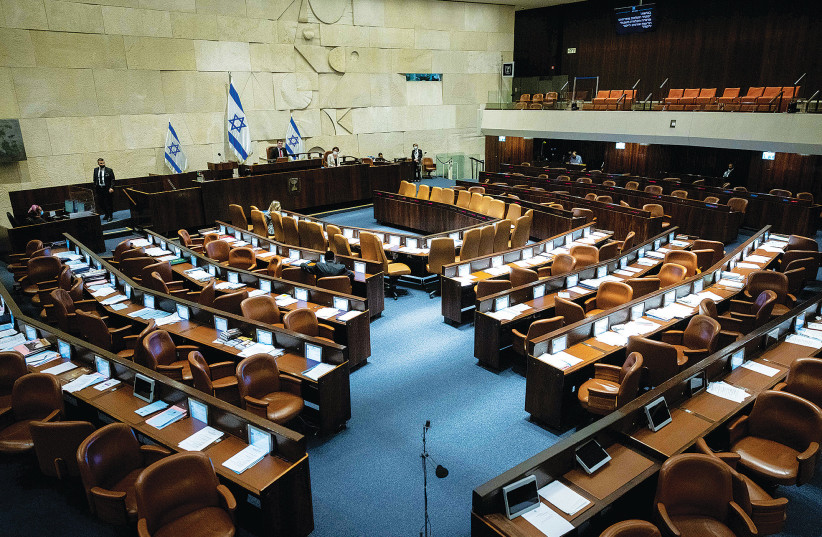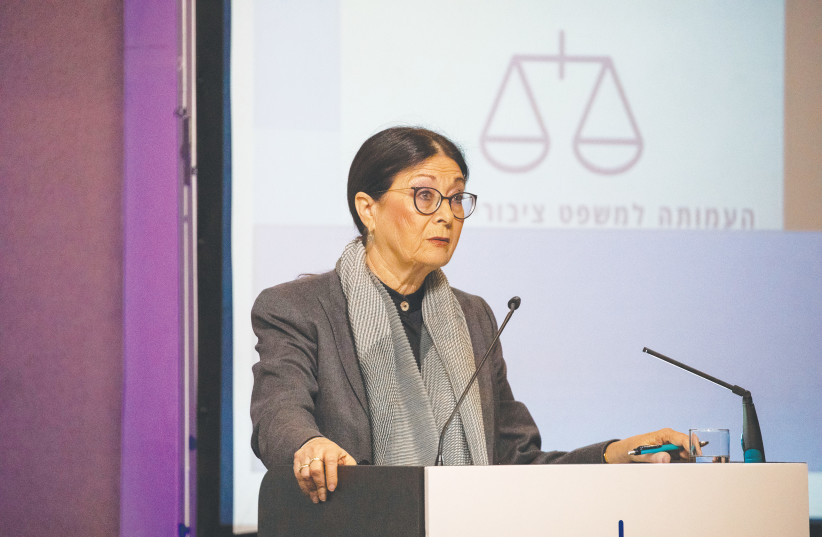The government is making “every effort” to resolve the argument over its proposed overhaul of the judicial system through dialogue, Prime Minister Benjamin Netanyahu said ahead of the weekly cabinet meeting on Sunday.
“With goodwill by both sides, I am convinced that it is possible to reach agreements – and I give this my full backing,” Netanyahu said.
The prime minister made similar comments in a CNN interview on Sunday, saying the protests against the reform were “a sign of the robustness of the public debate,” which Netanyahu said he was “working to resolve with as broad a consensus” as he could.
The prime minister added to CNN interviewer Fareed Zakaria that he would not agree to the removal of checks and balances on the power of the majority, and instead was seeking to find a middle ground.
The prime minister’s comments came despite comments by other senior Likud members, whom KAN Radio reported said that the Likud will not be able to reach agreements with Yesh Atid at the ongoing negotiations at the President’s Residence, since the opposition party is doing “everything it can” to prevent agreements in talks.

Yesh Atid is insisting on including the issue of a haredi (ultra-Orthodox) conscription law in the talks, and also has different opinions from National Unity on other matters relating to the judicial reform – and therefore, the Likud will be able to reach agreements only if talks are held with National Unity without Yesh Atid, KAN quoted the Likud members as saying.
A spokesperson for Yesh Atid confirmed that the party wished to discuss the issue within the framework of the talks at the President’s Residence.
KAN quoted “senior Yesh Atid members” as saying in response that cooperation between them and National Unity is close and that they see eye to eye. Yesh Atid asserts that Likud is attempting to spread conflict in the opposition, and that the real issue is Yesh Atid’s refusal to agree to the government selecting two judges on the judicial appointments committee, KAN reported the Yesh Atid members as saying.
Justice Minister Levin says that agreement requires real negotiation
Justice Minister Yariv Levin said during his speech at a pro-reform rally on Thursday that “agreement means real negotiations and also a willingness to accept large parts of the reform and not to hold discussions for over a month and say ‘no’ to every proposal.”
National Unity leader MK Benny Gantz responded that Levin’s attack on the opposition over the negotiations, which are being held behind closed doors, raised “difficult thoughts” about the government’s actual sincerity in reaching an agreement.
President Isaac Herzog addressed the heightened rhetoric, saying during a Bible study group at the President’s Residence on Sunday that his staff was making a “Sisyphean [sic] and non-stop effort to advance dialogue and broad understandings,” despite the “hate” and “polarization” in Israeli society.
“This requires all of us to act moderately, to restrain comments and behaviors, [and] to show responsibility, especially with regard to public representatives and servants,” Herzog said.
The president expressed his support for High Court Chief Justice Esther Hayut and Attorney-General Gali Baharav-Miara, whose pictures were stomped on during Thursday’s pro-reform rally.

Sunday judicial reform protests
Also on Sunday, protesters against the judicial reform disrupted a speech by Communications Minister Shlomo Karhi at a conference hosted by an organization called “The New Liberal Movement.” The disruptions lasted for 20 minutes, after which Karhi said that “this is exactly why a reform is needed in the media, because the public is incited by the propaganda channels,” according to a report in Maariv.
Knesset Constitution, Law and Justice Committee Chairman MK Simcha Rothman also spoke at the conference, and was met after his speech with cries of “shame,” Maariv added.
The issue of the judicial overhaul led to an unusual clash between coalition MKs during a Knesset Economics Committee session.
The committee chairman, Likud MK David Bitan, said the reason the coalition had been forced to rush the reforms after taking office was pressure by the haredi parties, who insisted specifically on a provision to enable the Knesset to override High Court rulings to be able to legislate a sweeping exemption for haredi men from IDF service. This forced the coalition to focus on the judicial reform and not on important issues such as the high cost of living, Bitan charged.
United Torah Judaism MK Moshe Gafni took issue with the comment, saying the fact of the matter was that the coalition had not even progressed with an override clause, and instead had focused on a demand by Levin to alter the makeup of the Judicial Selection Committee. This proved that the haredim were not to blame for ignoring the high cost of living, Gafni argued.
The prime minister addressed a number of other issues at the start of Sunday’s cabinet meeting.
Regarding the national budget, Netanyahu said the 2023-2024 budget and accompanying Economic Arrangement Laws, which are being prepared in the Knesset’s committees, will bring “economic stability” and will launch the economy forward to new achievements.
“It is precisely during days of economic slowdown and global inflation that Israel can – and needs to – leap forward. We did this during the coronavirus. We did so during previous global economic slowdowns. And we will do so this time as well. We will bring economic stability. We will expand competition. We will bring in international retail chains to lower prices,” Netanyahu said.
Regarding security, the prime minister said his government would not enable Iran to wrap a “stranglehold” of terror around Israel’s neck. Regarding internal security, he reiterated his promise to National Security Minister Itamar Ben-Gvir to form a National Guard, calling this a “revolution,” alongside billions of shekels to add thousands of police officers, “all to restore the personal security of every Israeli citizen, including in the Arab sector.”
“We are opening the summer [Knesset] session, and we will work very hard for the citizens of Israel,” Netanyahu concluded.
